Still an MC20 with the 621-hp Nettuno V-6, plus a Liquid Crystal folding glass roof that can go opaque at a push of a button, up or down in 12 seconds flat. That’s quick.The Maserati MC20 Cielo Spyder Has a More Interesting Roof Than You’d Expect
Cielo means sky in Italian, and we knew the MC20 Spyder was imminent the moment the company rebooted itself by launching the coupé.
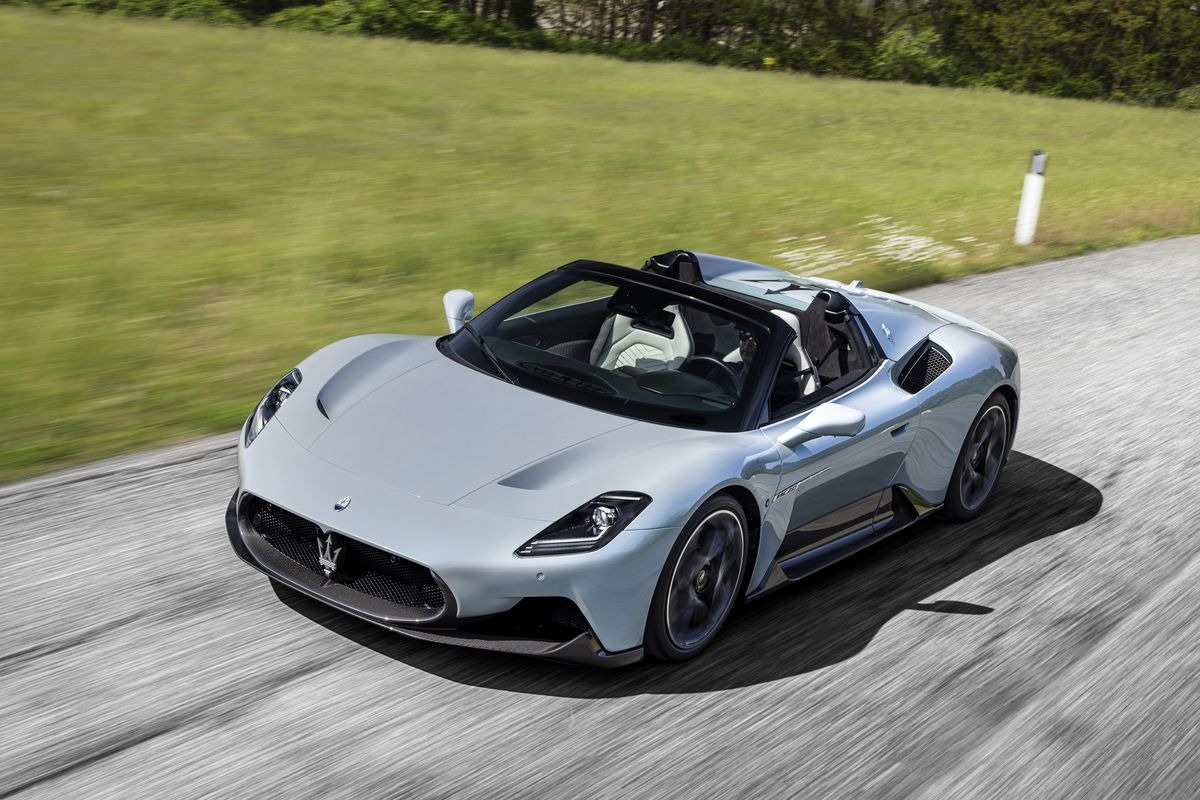
What we couldn’t foresee is Maserati’s plan to help supercar drivers get rid of their unfortunate hat choices by introducing a folding hardtop with Polymer-Dispersed Liquid Crystal technology, the more advanced smart glass Mercedes and McLaren customers could only dream of under their less sufficient SPD glass roofs.
What’s more, Maserati says the full-electric version of the MC20, the upcoming Folgore will also come first as a Cielo Spyder.
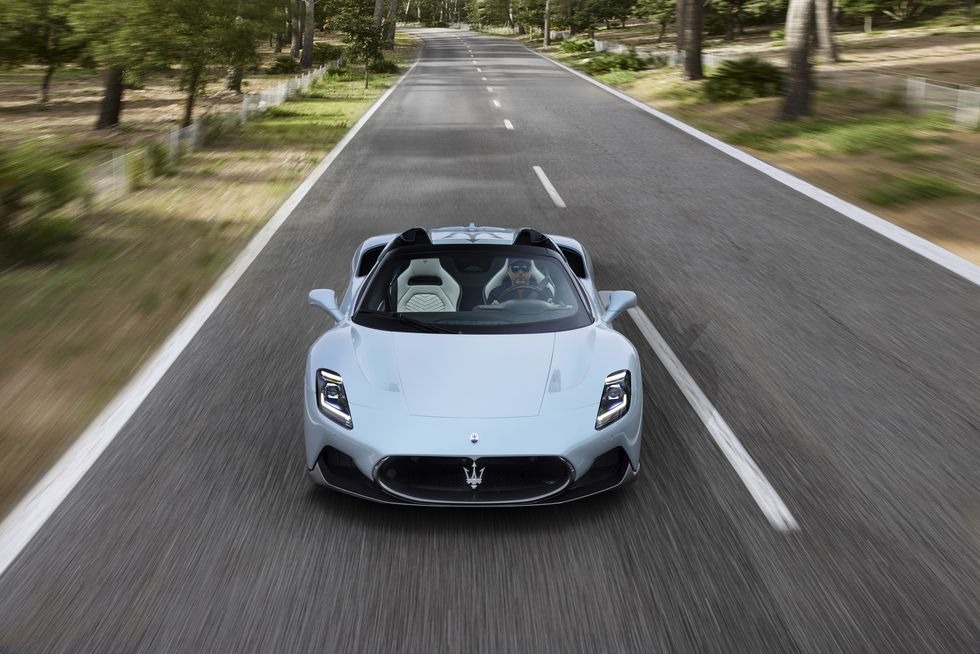
There are two active glass solutions in the luxury automotive segment. The suspended particle roof from automotive supplier Gauzy is transparent when not under power, and can only go from a light 30 percent tint to “a nearly opaque” 95-percent tint. The Maserati glass roof developed by Webasto, however, is fully opaque when the car is parked, going fully transparent if you wish.
What’s more, it offers 96-percent ray reflection due to a filter layer at the bottom, alongside better thermal and noise isolation. In practice, it looks something like this from the passenger seat:
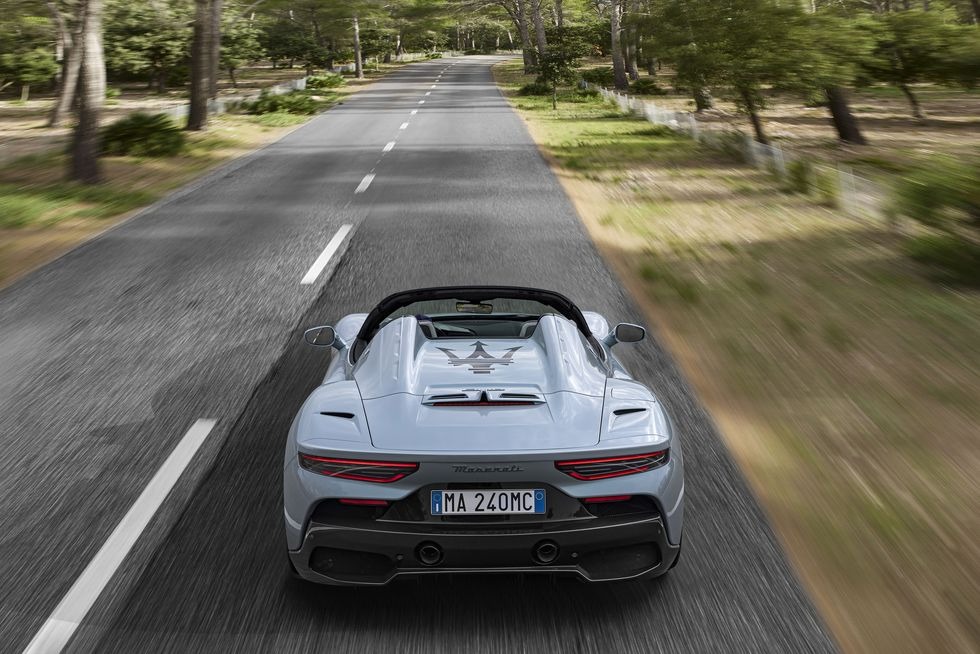
Operating at speeds up to 31 mph, this 12-second folding roof represents a 143-pound weight penalty over the coupé, not bad at all.
The carbon fiber monocoque is layered and foamed differently to maintain a high torsional rigidity, which is also aided by the one-piece aluminum frame of the roof mechanism, bolted in between the monocoque and the rear shock towers. Sixty percent of the spyder’s 3,395 pounds is on the rear axle, which now uses a milder differential ratio as well.
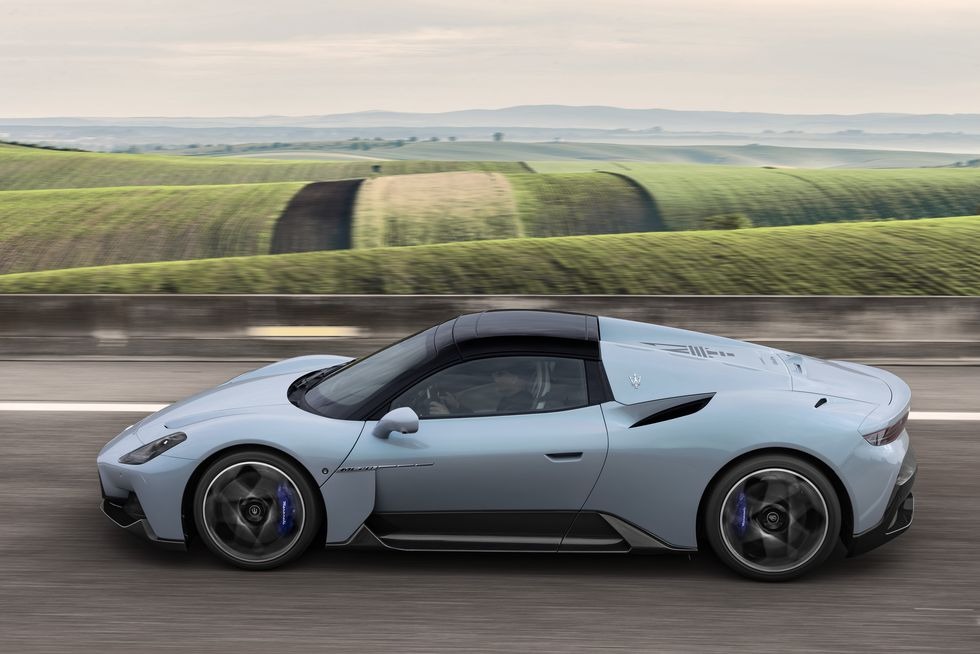
The chassis settings, power curves and performance figures remain unchanged. The slightly higher rear section brought a minimal increase in drag, while the springs are a touch stiffer to compensate for the extra weight, aided by more rebound.
Being the lifestyle choice, the MC20 Cielo Spyder isn’t here to break track records, yet will still reach 62mph in 3.0 seconds, and keep going until the 200 mph mark.
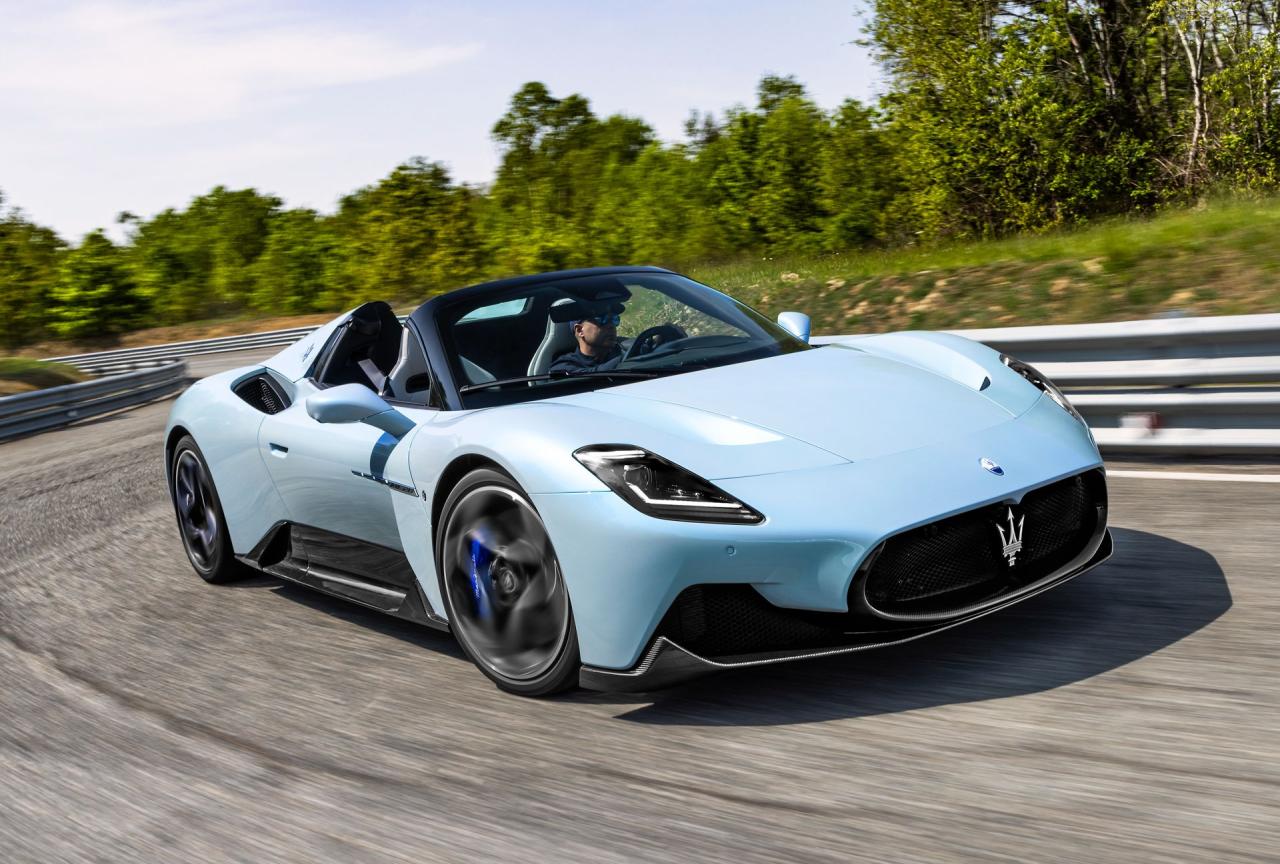
A popular design feature of the hardtop MC20 happens to be its rear screen with the trident-shaped cutouts that aid cooling of the 3.0-liter twin-turbo V-6.
With that piece being replaced by the roof holder and its cover, design chief Klaus Busse and his team went for new boomerang-shaped outlets cut into the side fenders, while engineering came up with deflectors that channel clean air to the intercooler through the equally discreet additional air intakes.
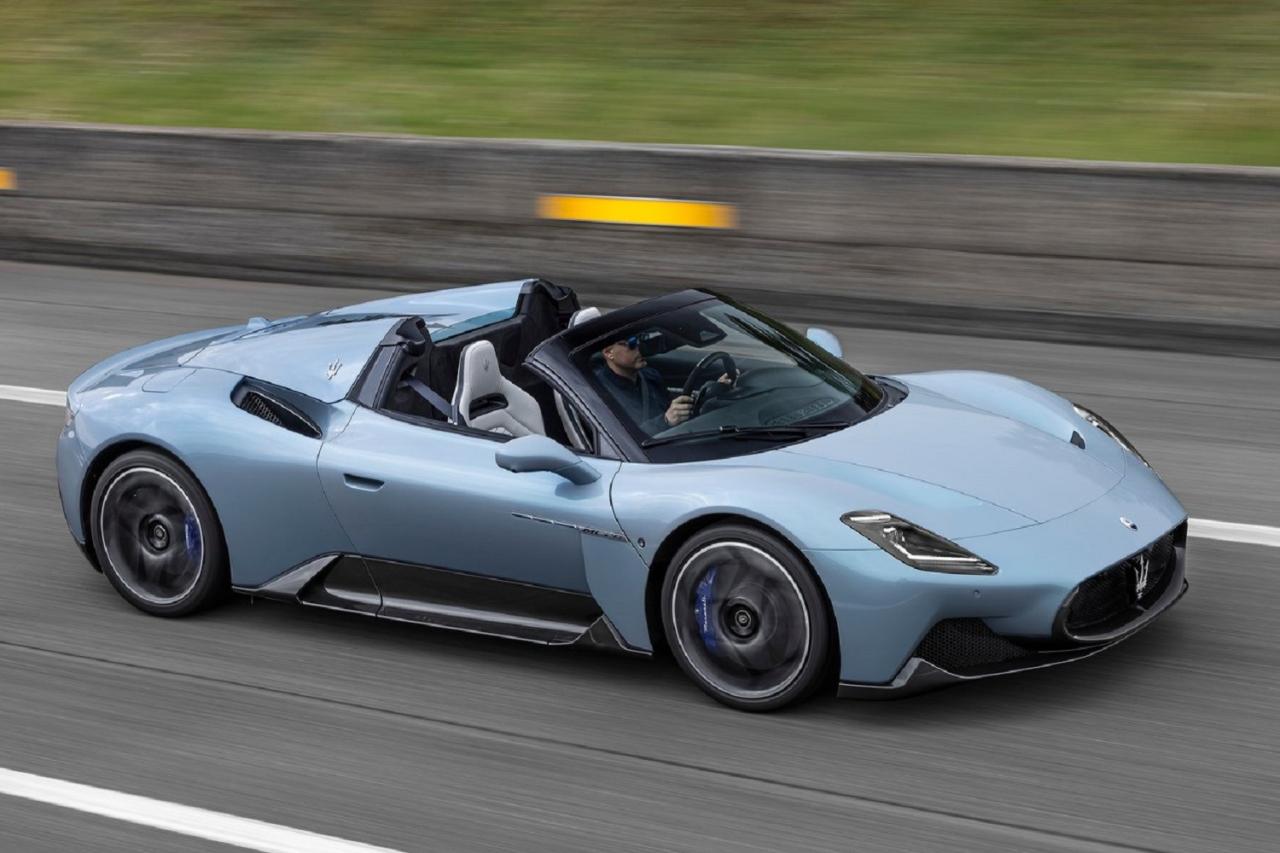
Busse explained that while his design team insisted on retaining the MC20’s sleek roofline and clean side profile, engineering got every chance to use the bottom half of the car, finished in carbon fiber instead of body color to optimize aerodynamics, resulting in the retained downforce levels and low drag despite the raised rear panel.
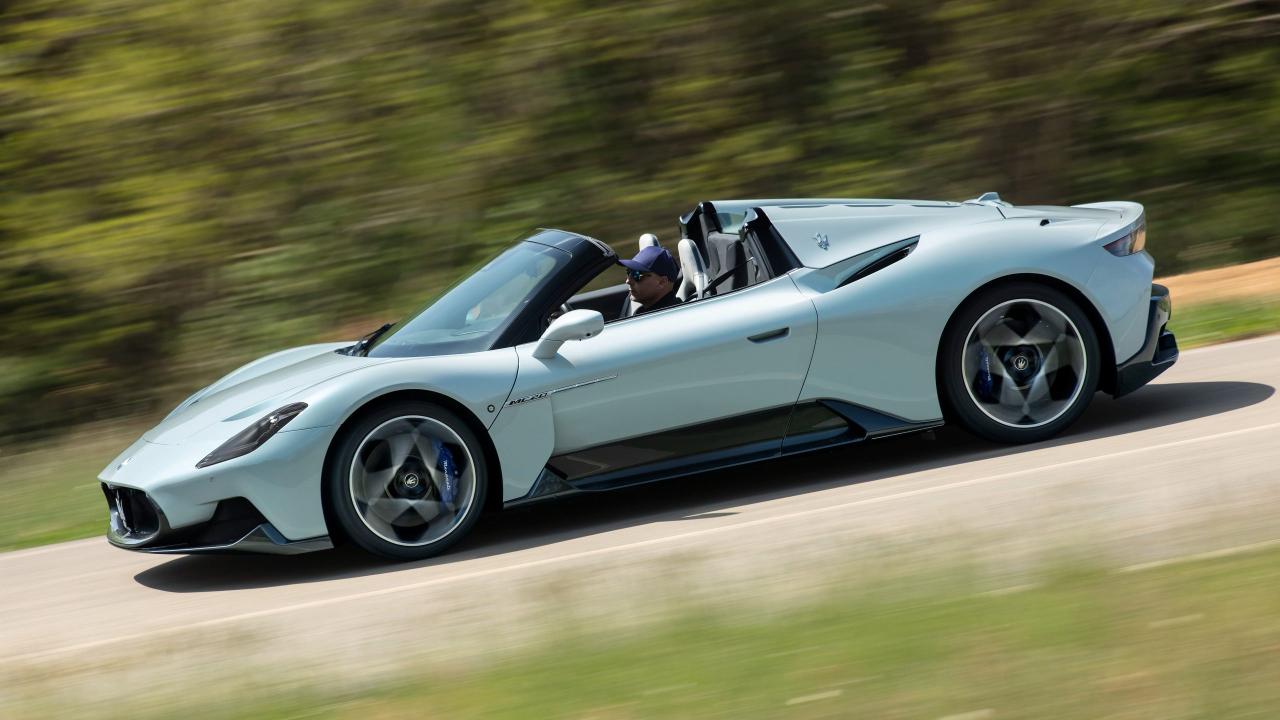
Optionally, for those who miss the rear screen, Maserati is offering a large titan finish Trident logo sticker on the roof cover panel, which screams MASERATI at everybody driving behind when the roof is raised or dropped. It’s also something of a visual trick to hide the cover’s extra volume.
The Cielo Spyder commands a $30,000 premium over the MC20 coupé, yet for the 2023 model year, the spyder brings major interior updates to the hardtop as well. Everything the Cielo can have, the coupé can have as well. A new digital drive selector, Alcantara steering wheel, new upholstery designs and extended digital functionalities of the MIA (Maserati Intelligent Assistant) are standard.

What isn’t are the new three-layer paint options, done with the panels painted first, and then the car, and not the other way around as they were before. According to the production team, that makes the process faster in the paint shop, part of the fully refurbished Maserati factory in Modena.
Maserati’s customization program is called Fuorisirie. When you spend supercar money, you might as well go custom, so it is pretty popular amongst MC20 customers. For Maserati fans, collectors and anybody who can’t wait to get an MC20 Cielo Spyder, the design team created the Primaseries Launch Edition, of which 60-100 will be made, depending on demand. It comes in a dedicated color called Acquamarina. Here’s what Maserati has to say about the shade:

“The concept that led the brand to select this special three-layer paint consisted of taking such a high-performance car in a more contemporary direction: holistic, high-tech and uniform in color, all at once.
Maserati searched for a color that would recall driving in the great outdoors, with the wind in your hair. A fresh, luminous and light shade. An iridescent color, in its interaction with light, revealing itself in a surprising way.
The base is a pastel grey inspired by racing, reminiscent of the MC20’s sporty DNA, accompanied by an iridescent aquamarine mica that enlivens the color and makes it stand out. MC20 Cielo is fitted out in a color that not only speaks of performance, but also serves as a nod to its racing origin by bringing together the brand’s dual souls: elegance and racing.”

Other than the launch hue, the MC20 Cielo’s only new color option is Grigio Incognito (a pastel grey). The range therefore encompasses five other colors: Bianco Audace, Giallo Genio, Rosso Vincente, Blu Infinito, and Grigio Mistero.
Klaus Busse told me that while at first, he preferred the launch color of the MC20, Bianco Audace, which is white with a blue tint, he came to the conclusion that the Grigio Mistero is the one he’d spec, which is the yellow with the blue tint, the colors of the city of Modena.
Maserati says that since everybody knew the spyder was coming, they came up with the Cielo’s active glass roof to still surprise people. This folding piece is also the largest in this segment, so you can see the blue sky above. The new wheel design with the hidden XX M (Maserati 20) is a nice touch as well.
Overall, the Cielo proves how close supercar coupés and Spyders came in terms of functionality and performance, in this case with no storage space sacrificed, and the extra weight of a light passenger. We already know the coupé is fun to drive and very easy to live with even on imperfect roads, so the Cielo’s roof seems like the icing on the cake.